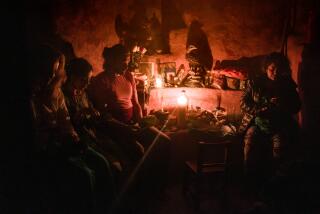Clinic helps Mayas get care
The Maya women sit patiently in the lobby of Clinica Oscar Romero, playing with their children and speaking in their native dialects of Kanjobal and Quiche.
Idalia Xuncax knows all of the women. She is their guide, translator and advocate in a healthcare world so foreign from their villages in Guatemala, where many relied on herbal medicines and faith healers.
For eight years, Xuncax -- who is also Maya -- has reached out to other Mayas and gained the trust of a community that has generally been reluctant to seek Western medical treatment. Largely because of Xuncax’s work, the number of Maya patients at the Los Angeles clinic has grown from just a few eight years ago to about 700 today. Many have diabetes, high blood pressure or high cholesterol.
But despite the gains, Xuncax and the clinic on Alvarado Street face daunting obstacles, including a shortage of interpreters and cultural differences that deter Mayas from seeking care, which can affect their health. Xuncax struggles constantly to get patients to show up for appointments and to take their medicine. She has to convince them that prenatal care won’t harm the fetus and that unprotected sex can lead to HIV.
“It’s not that they don’t want to be helped or be healthy,” Xuncax said. “Mostly, it’s cultural, that we don’t see doctors where we are from. We don’t have the flexibility of having a hospital or a clinic nearby.”
Some of the issues Xuncax encounters with her Guatemalan patients are commonly dealt with by doctors and nurses in California working with indigenous populations from Mexico and other parts of Latin America, experts said. Healthcare providers must realize that patients may come to a hospital or a clinic but are also seeking medical guidance from community elders and taking herbal medicines, said David Hayes-Bautista, who directs UCLA’s Center for the Study of Latino Health and Culture.
“You really need to understand the rest of the medical care world that these folks live in, of which standard Western medicine is only one facet,” he said.
Milton Alvarez, Guatemala’s consul general in Los Angeles, said healthcare is critical for Guatemalans living here, especially the Mayas, who may never have had regular access to doctors.
Members of the community depend on Clinica Romero to offer health services in their language. Tens of thousands of Mayas, including Kanjobal, Quiche and Mam, live in the area, primarily concentrated in the Pico-Union and Westlake neighborhoods.
Maria Baltazar, 28, who is Kanjobal, started going to the clinic when she was pregnant with her third child, now 6. During her prenatal care, Baltazar said she learned that she had early stage cervical cancer. Baltazar said she encourages other Maya women to seek prenatal care and get gynecological exams.
“I tell them it’s very important,” she said. “If I hadn’t gone, I would have gotten advanced cancer.”
Like many immigrants, some Mayas are reluctant to seek medical care for fear of being deported or because they do not have insurance and don’t know that they can receive free services at Clinica Romero. The clinic receives private donations, as well as Los Angeles County, state and federal funds.
Xuncax, who emigrated from Guatemala in 1981 and is now a U.S. citizen, was hired at Clinica Romero in 2000 as an interpreter and soon became a case manager. Like many of her patients, she has a round face and short stature, standing just 4 feet, 8 inches tall. She speaks English, Spanish and Kanjobal fluently.
When Xuncax started at the clinic, she immediately posted fliers in Kanjobal at schools, stores and hospitals. But because many Mayas can’t read or write, the fliers didn’t help. So she printed new ones in Spanish and English, with pictures of Maya women and children. Then the patients came -- and started bringing their children, parents and neighbors.
“The word got out all around Pico-Union,” Xuncax said.
Clinic staff, including Alba Escobar, who heads the women and children program, met with Maya leaders to gain their support. And the clinic received a federal grant to do a healthcare study about Mayas living in Los Angeles.
“We didn’t know anything about the Mayan community, except they were living around the clinic,” Escobar said. “We decided to find out more about them and see what more we could do.”
They went to soccer fields, churches and supermarkets and talked to hundreds of Mayas, finding that many were waiting until they ended up in an emergency room to seek medical care.
With another grant, the clinic started treating Maya patients. A Kanjobal speaker was put at the front desk, easily accessible to patients. But many patients still went directly to Xuncax’s office, often with concerns that had nothing to do with healthcare.
On a recent night, a woman asked if she could fill out her application for WIC, a federally funded program for women, infants and children.
“If I don’t do it, who is going to?” Xuncax said.
She said she tries to teach her patients to take control of their own healthcare, but often she has to start with basic information, including what diabetes is and how a woman gets pregnant. Xuncax said her next goal is to offer classes in indigenous languages on topics such as family planning, first aid for children and oral health.
--
More to Read
Sign up for Essential California
The most important California stories and recommendations in your inbox every morning.
You may occasionally receive promotional content from the Los Angeles Times.










